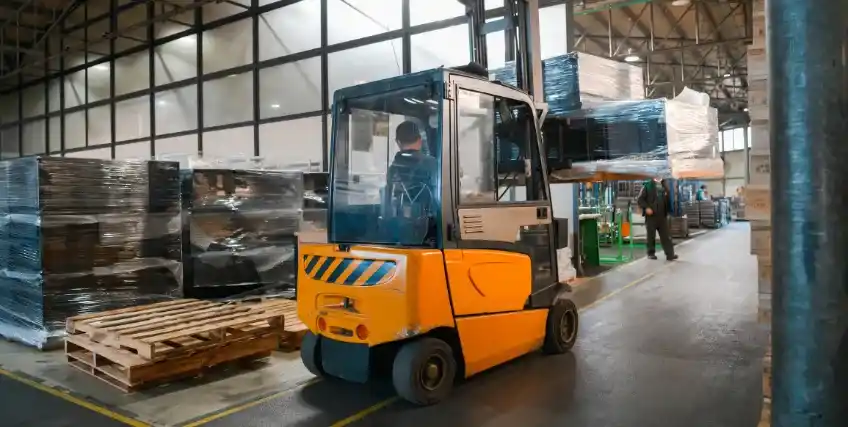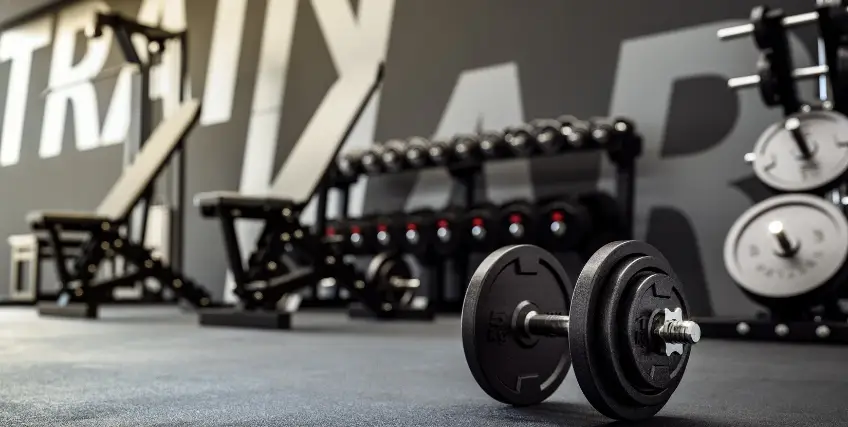Equipment Financing for Small Businesses Benefits
October 31, 2025 | Last Updated on: October 31, 2025

Running a small business often means balancing growth and cash flow. You need equipment to serve customers, boost productivity, and stay competitive, but buying that equipment outright can put serious pressure on your budget. That's where equipment financing options for businesses address that need.
These financing tools allow business owners to acquire the machinery, tools, or technology they need without draining working capital. And unlike traditional business loans, equipment financing options for businesses are designed around (and secured by) the asset itself, giving you greater flexibility, easier qualification, and long-term value. Here's a closer look at how equipment financing options for businesses compare to a standard bank loan, and why they could be the smarter move for your business.
Why Equipment Financing Matters for Small Businesses
Every business relies on equipment to some extent, whether you're a restaurant outfitting a new kitchen, a construction company upgrading its heavy machinery, a medical practice investing in diagnostic tools, or a small grocery store managing inventory and ringing customers up at a checkout stand.
However, large equipment purchases like these can quickly deplete your cash reserves and leave you without important business savings. Traditional loans can help, but they often come with strict eligibility requirements and longer approval times that might slow down your plans and impact your business.
Equipment financing options for businesses provide a more flexible way to access your new equipment needs. Instead of applying for a loan and offering collateral in the form of savings or other assets, the equipment you buy is used to secure your funding.
For small businesses looking to grow efficiently or take advantage of new opportunities, that's a big win.
It's not just about convenience, either; it's also about strategy. By using equipment financing loans, you can stay ahead of competitors, try new technology, replace outdated tools before the end of their useful life and save your cash for other priorities (like payroll, marketing, or expansion).
Equipment Financing Options: Loans, Leasing and Alternatives
Put simply, equipment financing options for businesses allow you to purchase or lease business equipment without paying upfront and in full. But before you can decide whether equipment financing is right for your business, it helps to understand how it really works.
Equipment loans
With an equipment financing loan, a lender gives you funds to buy a specific piece of tech or industrial equipment. The equipment itself serves as collateral to secure the loan amount, usually eliminating the need for personal or business guarantees. You'll agree to defined repayment terms, though a down payment may or may not be required.
You'll have ownership of equipment the same as any other financed item, like a home or car. And once your monthly payments are complete, that equipment is yours outright to keep, upgrade, or sell as you wish.
There are also possible tax benefits that come with purchasing new or used equipment. Even if you use an equipment loan to buy the tech or machinery for your business needs, you can still deduct the full cost of the equipment from your annual revenue the year it's placed into service, even if you'll be paying off an equipment loan for a while.
These tax savings can be significant, though the benefits may vary depending on the type of equipment you buy. Be sure to check with a tax professional to learn more about your tax deductible options.
Equipment leasing
Leasing, on the other hand, lets you use your equipment for a fixed period of time with regular payments but no immediate ownership. At the end of your lease term, you can often renew your lease, upgrade to other equipment, or buy the equipment for a predetermined amount. Many equipment leasing companies specialize in helping small businesses stay current with technology and machinery without the upfront cost or tying up capital.
Whether you choose to finance or lease depends on your business's cash flow and financing needs, how long you plan to use the equipment, and how quickly your industry evolves.
There may also be tax benefits for leased equipment, but it depends on the type of lease your business uses. For example, the Section 179 tax deduction is available for equipment within a capital lease agreement, but borrowers with operating leases cannot access the savings. However, be sure to consult with a certified tax professional.
Equipment Financing Options for Businesses versus Traditional Loans
When you put equipment financing options for businesses side by side with traditional business loans, the differences are pretty clear. This is especially true for small businesses that need to move fast.
Bank loans often come with more red tape. Banks usually want to see long credit histories, several years in business, and plenty of collateral. Loan terms and interest rates can vary based on your credit score and down payment, so startups and new borrowers won't be able to access the most competitive rates. These lenders also take time to work through the application process; it can take weeks and there's no guarantee of approval in the end.
Equipment financing options for businesses, on the other hand, are built for speed and practicality. Since the equipment you're buying acts as collateral, lenders focus more on the asset's value and your ability to make regular payments. That flexible financing often means lower business and personal credit barriers and quicker loan decisions.
The biggest advantage, though, is how equipment financing options for businesses protect your cash flow. Instead of spreading a lump-sum loan across multiple business financing needs, equipment financing solutions are purpose-built. The funds go directly toward the equipment purchase, keeping things simple and predictable.
In short: Traditional loans are broad but usually slow-moving, and creditworthiness can be a big barrier for smaller or newer businesses. Equipment financing options for businesses, on the other hand, are focused, flexible, and perfect for real-world business needs.
Key Benefits of Equipment Financing Options for Businesses
The right equipment financing options for businesses can do more than just cover your machinery expenses. They can also strengthen your business's financial foundation.
Preserves cash flow
Instead of paying in full upfront, you spread out the cost of equipment with predictable monthly payment options. This frees up your working capital for things like payroll, inventory, and day-to-day operations, and keeps your cash reserves healthy.
Offers typically easier approval and built-in eligibility
Because the equipment secures the loan, qualification tends to be more flexible than with loans or business lines of credit. Lenders will consider your ability to generate revenue and make payments, rather than focusing solely on credit score or years in business. This is why equipment financing options for businesses can be an accessible option even for younger companies or those rebuilding their credit.
You'll stay more competitive with new(er) technology
Outdated equipment can limit growth and even be a safety hazard, but financing lets you access modern tools and technology when you need them most. Whether that's upgrading manufacturing machinery, replacing vehicles, or installing new software, you'll avoid the heavy upfront cost but still get yourself the equipment you need now.
Potential tax advantages
Financed or leased equipment can often be written off or depreciated to save you money, depending on your structure and agreement. It's important to speak with a tax professional to identify the most beneficial approach.
Allows flexible, scalable growth
Many of the best equipment financing companies are willing to design repayment terms to fit your cash flow patterns. Whether your business is seasonal or steadily growing, this flexibility helps you scale on your own schedule and terms.
Leasing vs. Financing: Finding the Right Fit
Both leasing and financing are valuable equipment financing options for businesses, but the best choice depends on how long you'll use the equipment and how quickly it becomes obsolete.
- Leasing works well if you want access to newer models without worrying about resale value. It's especially useful for technology or specialized equipment that updates frequently, especially if you only plan to hold onto equipment for the short-term.
- Financing is better for long-term assets that hold value over time, like trucks, industrial machines, or restaurant equipment. The equipment is yours to keep once you've finished making your payments, which can build equity in your business.
Many equipment leasing companies will help walk you through both options so you can see the cost and benefits before deciding.
Final Thoughts
For small business owners, equipment financing options can unlock your next stage of growth without draining your cash reserves or limiting your ability to invest elsewhere in your business. Equipment financing can be faster, more accessible, and better tailored to the tools and equipment your business actually needs, making it a smarter choice than business banking options or traditional loans for many entrepreneurs.
Whether you're expanding to a new store, upgrading construction equipment, or just getting started and need to outfit your office with computer tech, equipment financing options for businesses can help you stay competitive. The right financing doesn't just help you buy… it helps you build.
FAQs on Equipment Financing Options for Businesses
1. How is equipment financing different from a standard business loan?
Traditional loans can rely heavily on your overall credit and financial history, while equipment financing usually focuses on the value of the asset you're buying.
2. Can I finance used equipment?
Many commercial equipment financing lenders allow you to finance both new and pre-owned equipment, as long as it's in good condition and holds resale value. There may be borrowing and condition limits, so be sure to ask about your options.
3. Are there tax benefits to equipment financing?
Depending on your agreement, you might be able to deduct interest or depreciation. Leased equipment may also qualify for certain deductions. Always confirm details with your tax professional.
4. Can I buy equipment with an SBA loan?
Loans backed by the U.S. Small Business Administration (SBA) can indeed be used to purchase equipment for your business. Like a traditional loan, though, they can have high eligibility limits, many application requirements, and a lengthy approval process.
5. What's the difference between leasing and financing equipment?
Both leasing and financing are equipment financing options for businesses with monthly payments for a set term. Leasing lets you use the equipment for a set time with the option to upgrade or return it later. Financing lets you own the equipment outright once it's paid off.
Frequent searches leading to this page
Term Loans are made by Itria Ventures LLC or Cross River Bank, Member FDIC. This is not a deposit product. California residents: Itria Ventures LLC is licensed by the Department of Financial Protection and Innovation. Loans are made or arranged pursuant to California Financing Law License # 60DBO-35839




